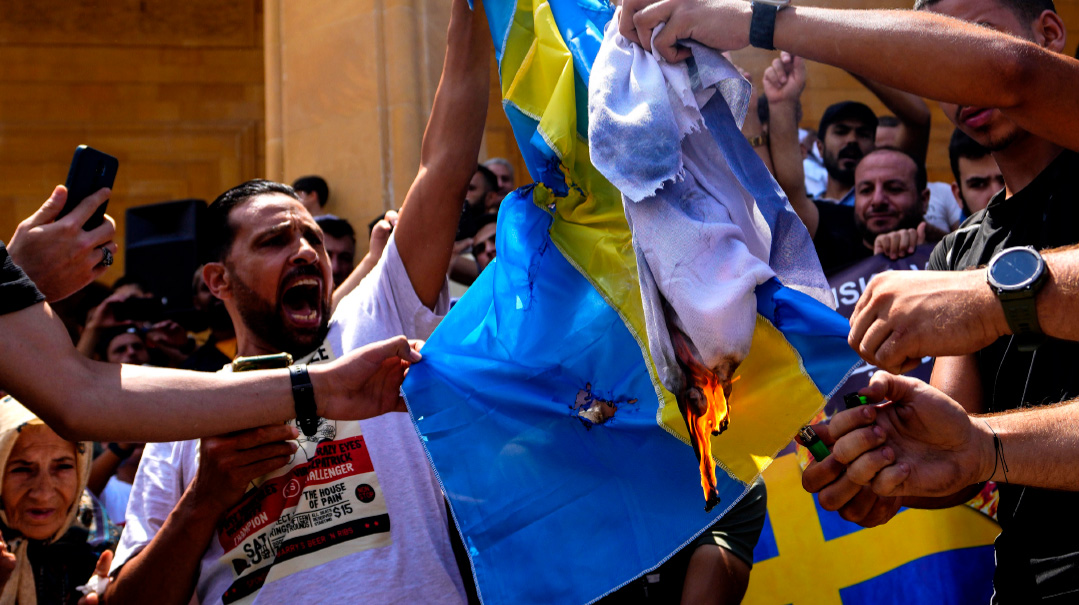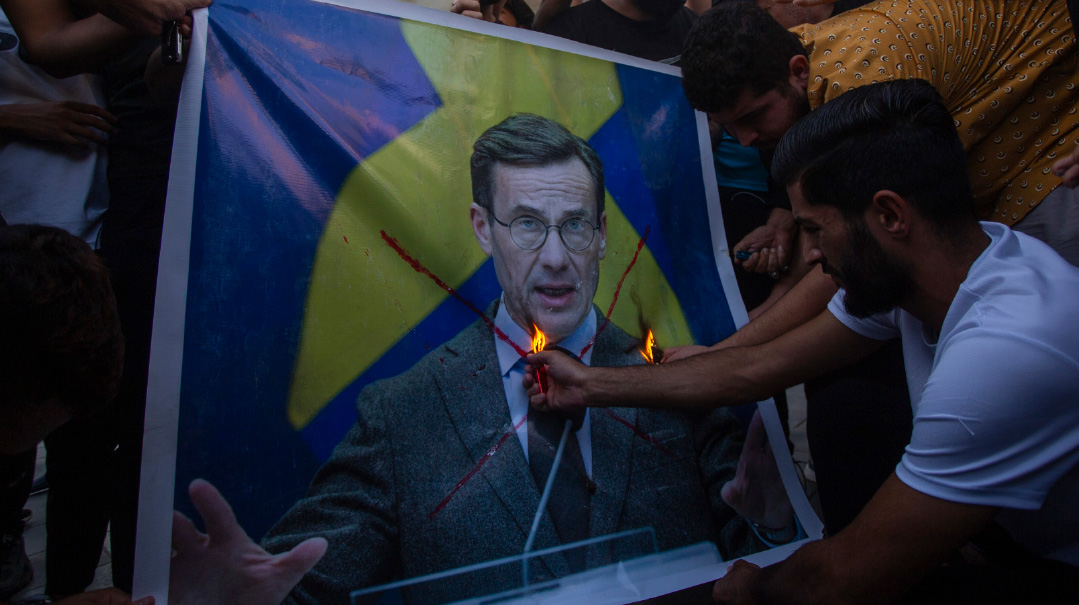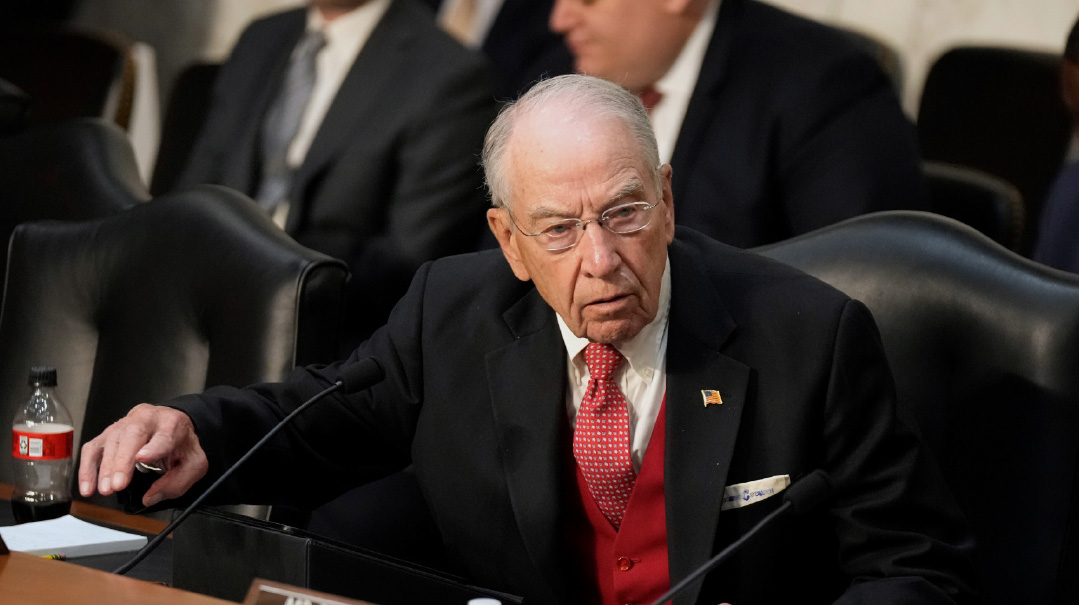Burning Ambition

Why does Sweden allow Quran burnings?

Photo: AP images
In the middle of a cordoned-off area surrounded by nervous police officers stands a man with a megaphone in one hand and a book in the other. The man, visibly ecstatic, tears pages from the book, wipes his shoes with it, and finally, as he had forewarned, sets it on fire.
This was no ordinary book: It was a copy of the Quran, the sacred text for Muslims. This disturbing scene unfolded on June 28 in Stockholm, Sweden, a city renowned for its social cohesion and tolerance. Similar incidents have also occurred in Copenhagen, Denmark, since 2020.
Unfortunately, as some had predicted at the time, the possibility of this happening with a copy of the Torah is becoming increasingly likely. In fact, the Swedish government approved a gathering in late July in front of the Israeli embassy in Stockholm, where an individual intended to burn a Chumash.
The news sent shockwaves through the international Jewish community. Prominent leaders, including Israeli prime minister Binyamin Netanyahu, went on high alert and closely monitored developments.
However, an unexpected twist in the narrative emerged when local Islamic authorities intervened at the 11th hour, and the protest was averted. Perhaps taking a page from the playbooks of local activists in America, Jews and Muslims are collaborating in the Nordic countries to prevent provocative desecrations of sacred texts.
But in the meantime we are left to grapple with the conundrum that these types of gratuitous displays seem to occur only in countries known for peaceful coexistence and civil liberties that have enshrined “freedom of expression” in their constitutions. Now they see how this principle can become a double-edged sword when wielded cynically in the wrong hands.
Far-right actors are meticulously weaving a plot to propagate hatred against ethnic minorities — behind a legitimate argument for the necessity of freedom of speech — by triggering a violent Islamic reaction. It bears mentioning here, of course, that many of those currently propagating Islamophobic beliefs have in the past expressed anti-Semitic sentiments. Their efforts appear to be yielding gains, and in the words of Prime Minister Ulf Kristersson, Sweden is facing its gravest security crisis since World War II
An Extreme Problem
Although the latest incident of Quran burning was perpetrated by Salwan Momika, an Arab immigrant of Iraqi descent, the driving forces behind such sacrilegious acts have predominantly been far-right parties. They have been spearheaded by Rasmus Paludan, a Danish activist and politician who also holds Swedish citizenship, affording him the opportunity to conduct such demonstrations in both nations. A few months ago, he burned a copy of the Quran in front of the Turkish embassy in Stockholm.
According to sources who did not want to be named, the clear objective of these far-right parties is to provoke the sizable Arab immigrant population in these countries, inciting violent reactions as “evidence” for their Islamophobic rhetoric. It is not coincidental that these historically center-left countries, which opened the doors to Arab refugees, have witnessed a marked surge in far-right activity in recent years.
This has become a major headache for Swedish authorities on two fronts. The Quran burning protests have unleashed furious crowds in Arab countries, leading to attempts to set fire to the Swedish embassy in Baghdad and Iraq’s subsequent expulsion of the ambassador. The incidents also affect Sweden’s plan to join NATO, as one of the countries with veto power is Turkey.
In fact, although Turkey had initially approved Sweden’s entry into the alliance, the government of Recep Tayyip Erdogan clarified that it might reconsider its decision if Quran burnings persist. The Swedish prime minister asserted in response that there are Russian interests spreading misinformation about Quran burnings in Sweden to halt its accession to NATO.

Photo: AP images
Why the Nordic Countries?
While authorities in both Sweden and Denmark have vehemently condemned these actions, one question remains unanswered: Why do such incidents seem to occur specifically in these countries?
One common response is that these nations are more permissive of public expressions of blasphemy. But this tells only half the story. In fact, on this question, France and the United States are legally as “permissive” as Sweden and Denmark. For example, back in 2010, American pastor Terry Jones announced plans to burn 200 copies of the Quran in Florida as retaliation for the 9/11 attacks. Though the ensuing social uproar forced him to back down, legally he could have carried out the act.
What rather seems to set Sweden and Denmark apart from other countries is their internal interplay between legal protection for freedom of speech and a very active far-right movement. Other countries with strong traditions of civil liberties, like the US, tend not to have strong far-right movements. And countries with strong far-right movements, such as France and Germany, have laws on the books curtailing hate speech.
In Sweden and Denmark, on the one hand, freedom of expression is highly valued and often utilized by artists and figures associated with the center left. On the other hand, the far right has gained considerable ground in these countries. They use the notion of “freedom of expression” as a legal shield to vocalize their opposition to groups they detest, particularly in recent times, following increased migration from Islamic countries.
This blend of freedom of expression with the far right is what allows such actions to take place in Denmark and Sweden. Repercussions have started to manifest: Islamic extremists have begun targeting Scandinavian interests. (As of press time, in the past week alone, five individuals with ties to Islamic terrorism were arrested on suspicion of planning an attack in Sweden.)
What It Means for the Jews
Rabbi Mattias Amster, head of Stockholm’s Orthodox Jewish community, tells Mishpacha that despite all the turmoil surrounding the burning of sacred books, Sweden is not a dangerous place for Jews. He regularly goes out in public wearing a yarmulke and has never experienced an uncomfortable situation.
“What is happening is very sad, but it by no means reflects how Swedish society feels or how they express themselves toward the Jewish community,” says Rabbi Amster, the first Stockholm native to head the local community. “There is a minority of people who want to prove a point, but they cannot be compared to those who wanted to burn Torah scrolls in the past. Nevertheless, it is regrettable that some want to take advantage of a beautiful law such as freedom of expression and use it for something so harmful.”
Rabbi Amster stays in constant dialogue with authorities and says he has their support, within the framework of an interreligious dialogue that also involves representatives of the Muslim, Christian, and Hindu communities. They are all concerned about these protests and the potential for violent reactions.
“Obviously, I am against burning any kind of sacred book, regardless of the religion,” says Rabbi Amster. “However, the Jewish community fully supports freedom of speech. It’s just that we are saddened by how some are using it.”
The Israeli government has also weighed in with an official response, along the same lines as Rabbi Amster. “We defend freedom of speech, but this kind of act definitely crosses the line,” said Lior Haiat, spokesperson for the Ministry of Foreign Affairs, to Mishpacha. “We are working hard to prevent the burning of a Chumash. We have been in talks with the Swedish government and members of the Jewish community, and so far, we have been successful. However, we condemn the burning of any kind of sacred book, be it a Bible or a Quran. We believe that freedom of expression is a great value, but should not hurt the feelings of others.”
Geopolitical Repercussions
The ripple effects of the Quran-burning protest are still playing out. Fearing potential terrorist infiltration, Swedish authorities have taken unprecedented measures to strengthen border controls, at a scale unprecedented since World War II. Meanwhile, Muslim religious leaders in many countries have initiated an economic boycott against Swedish and Danish products.
Denmark’s ruling parties are striving to end attacks on religious texts, with some advocating limits to free speech. Danish prime minister Mette Frederiksen said to the press, “I don’t consider it a restriction on freedom of expression that you can’t burn other people’s books.”
The opposition forces, however, have rejected any such restriction, asserting that free speech is a “fundamental pillar” of their society. Seven Danish opposition parties signed a joint letter asserting that any restriction on free expression would be “unacceptable.” Right-wing lawmaker Sussie Jessen said, “I would never burn books, but I will fight for other people to have the right to do it.”
Of course, any Danish government action will have to take into consideration the potential for a violent reaction. This has been amply demonstrated over the years, particularly by the chaos that ensued after magazines in both Denmark and France published cartoons of the Muslim prophet Muhammad. France suffered a deadly terrorist attack at the Charlie Hebdo magazine offices.
Sweden’s situation is a bit different, says Professor Diego Hammerschlag, who teaches comparative constitutional law at the University of Palermo. “The issue in Sweden is more legal than constitutional. There is no law that prohibits blasphemy. However, there is a law against hate speech, which is defined as any derogatory expression toward groups based on race, religion, or ethnicity. In fact, the Iraqi immigrant who burned the Quran was charged under this hate speech law.”
Of course, according to Western legal concepts, a criminal charge is not the same as being found guilty; the defendant will benefit by due process in a court of law. So while Sweden’s government continues to straddle the fence between defending Quran burnings as free speech and condemning them as inappropriate behavior, the world waits on tenterhooks for the next demonstration.
(Originally featured in Mishpacha, Issue 973)
Oops! We could not locate your form.







